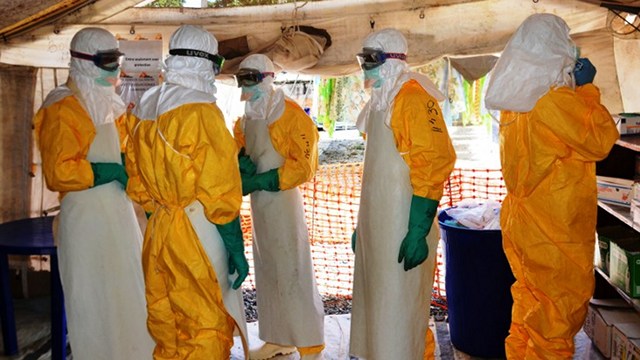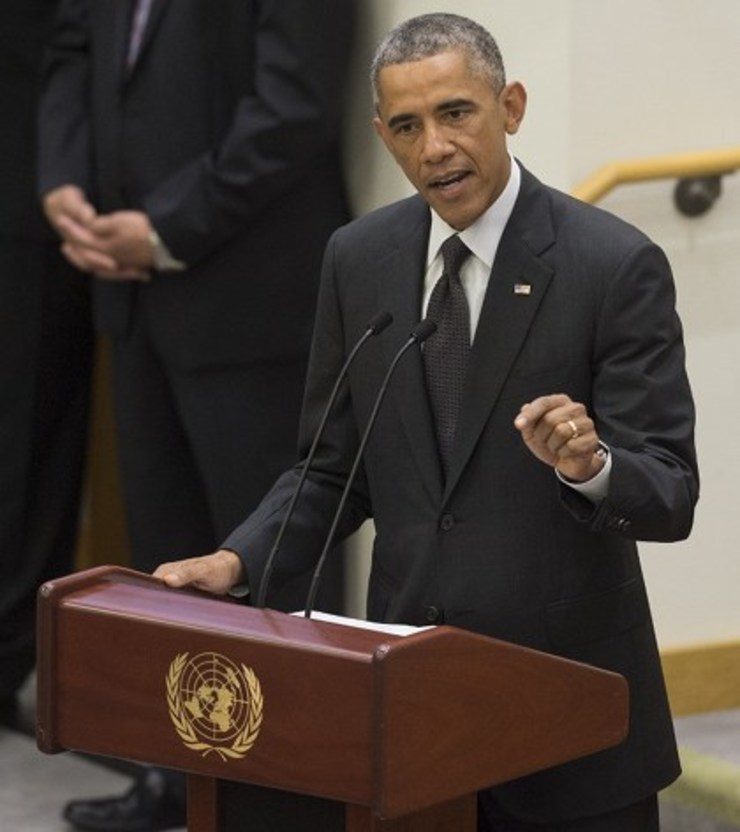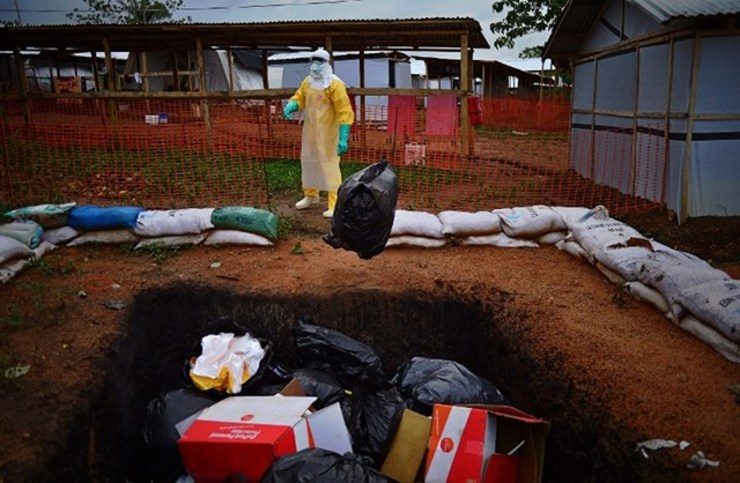SUMMARY
This is AI generated summarization, which may have errors. For context, always refer to the full article.

UNITED NATIONS – If there are blue helmets to maintain peace in conflict zones, should the world also have “white coats” for crises like the Ebola outbreak?
United Nations Secretary-General Ban Ki-Moon proposed the idea as US President Barack Obama and other heads of state met at the UN to discuss what they admit is a slow and inadequate global response to the worst Ebola outbreak in history.
Speaking at the high-level meeting he convened on the sidelines of the annual UN General Assembly, Ban said that the crisis in West Africa showed the need to strengthen early identification systems and swift action.
“We should consider whether the world needs a standby corps of medical professionals, backed by the expertise of [the World Health Organization] and the logistical capacity of the United Nations. Just as our troops in blue helmets help keep people safe, a corps in white coats could help keep people healthy,” Ban said on Thursday, September 25.
It was a reference to UN peacekeepers tasked with providing security and support to war-torn countries transitioning to peace.
The most severely affected countries – Guinea, Sierra Leone and Liberia – are overwhelmed. They have weak health systems and lack human and infrastructural resources, having only emerged from conflict and instability. (READ: World ‘losing battle’ to contain Ebola)
The UN’s peacekeeping mission in Liberia is supporting efforts to fight the outbreak but admits it not medically trained to take a primary role.
The World Health Organization and groups like Médecins Sans Frontières (MSF) and the US Centers for Disease Control and Prevention are working to respond to the crisis but the needs are immense.

Obama pointed out that the international community is not sending aid, equipment and medical personnel fast enough to stop the epidemic. MSF has said that the hard-hit countries need helicopters and experts, but also basics like beds, soap and buckets.
“Right now, patients are being left to die in the streets because there’s nowhere to put them and there’s nobody to help them. One health worker in Sierra Leone compared fighting this outbreak to ‘fighting a forest fire with spray bottles,’” Obama said.
Ebola has infected 6,263 and killed 2,917 as of September 21, based on statistics affected countries reported to the World Health Organization (WHO). The UN said that the number of Ebola cases is doubling every 3 weeks. There is no proven cure yet for Ebola but the WHO said supportive care improves survival. (READ: Fast facts: Ebola)
WHO Director-General Doctor Margaret Chan stressed the need for an urgent response from the international community.
“Every day, every minute, counts. In some areas, no treatment beds are available. None at all. We cannot build new facilities fast enough. We must try harder. Good quality clinical care saves lives. In a humane world, we cannot allow the people of West Africa to suffer so much,” Chan said.
‘Worse than terrorism’
The meeting comes on the heels of Sierra Leone’s decision to take the drastic step of putting more than one million people in 5 districts under quarantine, the largest open-ended lockdown in the Ebola outbreak.
Speaking via video link, Sierra Leone President Ernest Bai Koroma said that the international community was “slow to recognize the threat for what it was.” He said the world is finally seeing that the outbreak is a challenge even beyond West Africa.
“Sierra Leone and its sister republics may be at the frontlines of this fight but we require the heavy aerial and ground support of the world to defeat a disease worse than terrorism,” he said.
President Ellen Johnson-Sirleaf of Liberia, the hardest hit country, echoed the message. “Today, we face perhaps the greatest challenge, for we cannot allow the projection of a worst case scenario that over 100,000 of our innocent citizens will die from an enemy disease they do not understand.”

Obama last week stepped up US response to the crisis, establishing a military command in Liberia to support civilian efforts. The US is also setting up a field hospital and a training facility for thousands of health workers form around the world.
The United Kingdom said it is giving $160 million dollars to fund 700 treatment beds, and a health center in Sierra Leone’s capital Freetown.
Canada announced it will contribute $27 million to the UN and NGOs to fight Ebola.
Japanese Prime Minister Shinzo Abe also said in his speech before the UN General Assembly that Tokyo will send $40 million more, on top of the $5 million in financial assistance and 500,000 personal protective equipment it earlier gave.
As for the UN, the newly created Mission for Ebola Emergency Response (UNMEER) is sending two million sets of personal protective gear, 470 trucks, up to 18 helicopters and aircraft starting Sunday to coordinate the response to the outbreak.
The UN estimated that the response will require nearly a billion dollars.
The high-level gathering follows a rare UN Security Council meeting last week, where the body declared Ebola “a threat to international peace and security.”
Breaking into tears, MSF’s Jackson Naimah of Liberia then made a passionate appeal to the council that illustrated the gravity of the crisis.
“We are trying to treat as many patients as possible but there are not enough treatment centers and beds. We have to turn people away. Patients are literally begging for lives. They feel isolated, alone. Ebola affects all aspects of our lives. The schools are shut down. I feel that the future of my country is hanging in balance.”
“We need your help. We need it now.” – with reports from Agence France-Presse/Rappler.com
Rappler multimedia reporter Ayee Macaraig is a 2014 fellow of the Dag Hammarskjöld Fund for Journalists. She is in New York to cover the UN General Assembly, foreign policy, diplomacy, and world events.
Add a comment
How does this make you feel?
There are no comments yet. Add your comment to start the conversation.